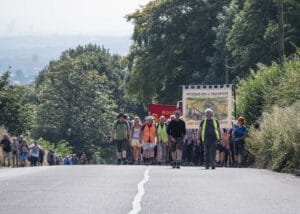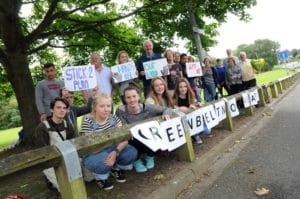Support us from £3/month
We deal with almost 1000 cases a year assisting communities, groups and individuals in protecting their local spaces and paths in all parts of England and Wales. Can you help us by joining as a member?
So often success depends on the power of people coming together, writes our general secretary, Kate Ashbrook.
Whether they are saving Bristol’s downs from car-parking, protecting London’s commons from commercial exploitation, or winning access to Worthing’s hinterland, the campaigning clout of local people is fundamental. And it always has been—witness the mass trespasses on Bolton’s Winter Hill (1896) and Kinder Scout (1932), and the rescue of Nottingham’s green spaces in 1845.
This power is what the government and its home secretary, Priti Patel, intend to curtail. The Police, Crime, Sentencing and Courts Bill, currently in parliament, aims to outlaw peaceful protest as well as to extend criminal trespass.

Smithills Dean Road, Bolton 125th Anniversary march in September 2021
The government’s planning reforms were set to reduce community involvement, until they were hastily ditched after they interfered with a Tory win in the Chesham and Amersham by-election. However, we are not optimistic that new proposals will be better.
Curtail
Even when it is not actively silencing protesters and bypassing communities, the government shows no interest in public access. This despite the promises in its 25-year environment plan of 2018, to make sure that our natural environment ‘can be enjoyed, used by and cared for by everyone’, and that there should be ‘high-quality, accessible, natural spaces close to where people live and work’.
While Natural England quietly and commendably rolls out the England Coast Path with its adjoining land, ministers turn their backs on payments for paths in the new environmental land management schemes (ELMS). They have abandoned their assurances, given during the passage of the Agriculture Bill, that ELMS would fund more and better access.
Snubbed
Moreover, the enforcement measures for agricultural payments should penalise path-blocking landowners, and lighten the load of hard-pressed highway authorities, but again there is silence.

Rally to save Longridge playing field in Knutsford, now designated as local green space. Photo: Knutsford Guardian.
Instead, national government has snubbed local government by deleting it from the title of the department which oversees it—now the department of levelling-up, housing and communities.
More than two years ago, the government’s Glover report on protected landscapes made powerful and far-sighted recommendations. These include new long-term programmes to increase the ethnic diversity of visitors, and freedom-to-roam rights—but still no official response.
Mark Gorman, in his book Saving the People’s Forest, describes how, 150 years ago, people power saved many of London’s open spaces. We need to revive that spirit with a mass movement for public access, to protect what we have and to create new rights and freedoms, for our health and well-being in troubled times.
This article first appeared in our member magazine, Open Space – Autumn 2021.
